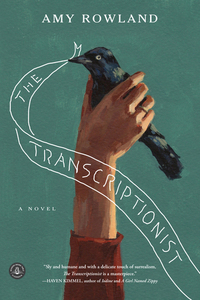Take a photo of a barcode or cover
This novel was ok - it wasn't terrible by any means, but it did feel like it was trying too hard to be The Next Great Novel, or at least A Deep and Intellectual Novel. I didn't feel like I ever really understood what Lena wanted, what drove her, or anything else about her. I can't say that I'd read it again, but it was enjoyable enough.
Much more than I expected...
I picked this up from my library, not knowing about it. What a deep and surprising read this was! This book was very artfully crafted as an exploration of what it means to be a part of the world, and how our environment encroaches, no matter how hard you try to isolate. The transcriptionist spends her days hearing news stories that need to be transcribed for the paper and slowly the stories impact her psyche. Cracks begin to form when she briefly meets a blind woman on a bus who seems to understand her. When she reads about the woman's remarkable suicide, she undertakes a journey to understand the woman and herself. Poignant, sage and deftly written. I loved the style where the themes circled the plot and kept ringing true and present.
I picked this up from my library, not knowing about it. What a deep and surprising read this was! This book was very artfully crafted as an exploration of what it means to be a part of the world, and how our environment encroaches, no matter how hard you try to isolate. The transcriptionist spends her days hearing news stories that need to be transcribed for the paper and slowly the stories impact her psyche. Cracks begin to form when she briefly meets a blind woman on a bus who seems to understand her. When she reads about the woman's remarkable suicide, she undertakes a journey to understand the woman and herself. Poignant, sage and deftly written. I loved the style where the themes circled the plot and kept ringing true and present.
Amy Rowland succeeds in packaging several provocative themes in her compact debut novel, “The Transcriptionist”. The most compelling asks, “What does it take for one to move from detached observer to active participant in the Game of Life?”
The story unfolds in a carefully measured manner. Rowland has a delicate sense of place, succeeding in making the reader feel a participant in the narrative. Stark juxtapositions appear at unexpected moments: screams & silence, blinding light & darkness, truth & lies. We learn to pay attention to these moments; they herald turning points not far ahead.
Nostalgia is used as an important literary element throughout. The longing for the past is not at all naïve or one-sided. The past is presented as foundational and primitive, in some cases worth preserving, in others necessary to abandon.
It is clear that Rowland is sharing something that is deeply understood and, more importantly, felt. Her story never feels contrived; the characters always plausible and real. “The Transcriptionist” is well worth the read. Its universality is guaranteed to strike a chord.
The story unfolds in a carefully measured manner. Rowland has a delicate sense of place, succeeding in making the reader feel a participant in the narrative. Stark juxtapositions appear at unexpected moments: screams & silence, blinding light & darkness, truth & lies. We learn to pay attention to these moments; they herald turning points not far ahead.
Nostalgia is used as an important literary element throughout. The longing for the past is not at all naïve or one-sided. The past is presented as foundational and primitive, in some cases worth preserving, in others necessary to abandon.
It is clear that Rowland is sharing something that is deeply understood and, more importantly, felt. Her story never feels contrived; the characters always plausible and real. “The Transcriptionist” is well worth the read. Its universality is guaranteed to strike a chord.
A powerful book about being consumed by your work, about the soul and soullessness of news, about ethics and decency. It’s not a very long book, but there’s a lot to it. I got it from the library, but it might be one I’d buy to read again.
There are some strange observations told with writing that is almost poetic. Some of it reminded me a little of Patrick deWitt, but the mood is different.
Very well done and worth seeking out, especially for journalists.
There are some strange observations told with writing that is almost poetic. Some of it reminded me a little of Patrick deWitt, but the mood is different.
Very well done and worth seeking out, especially for journalists.


